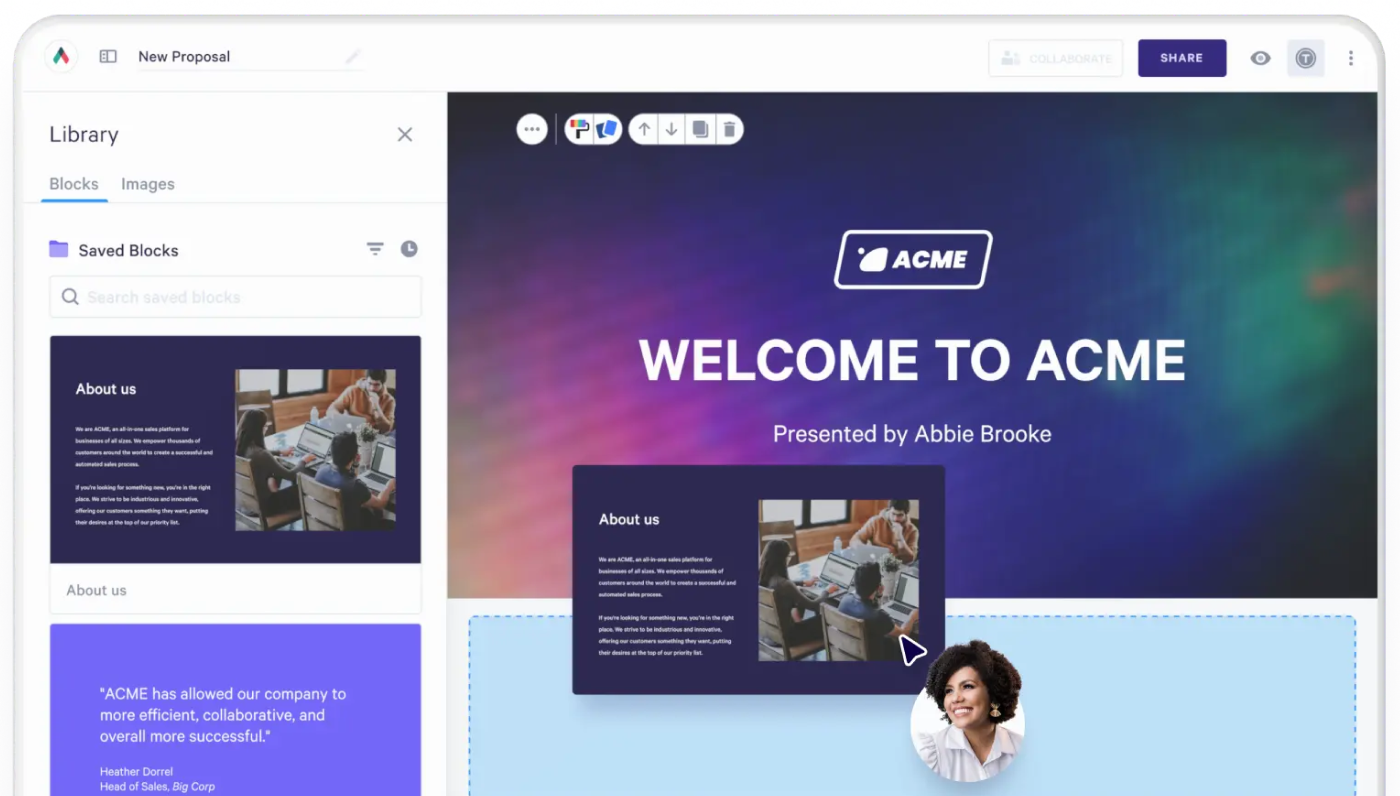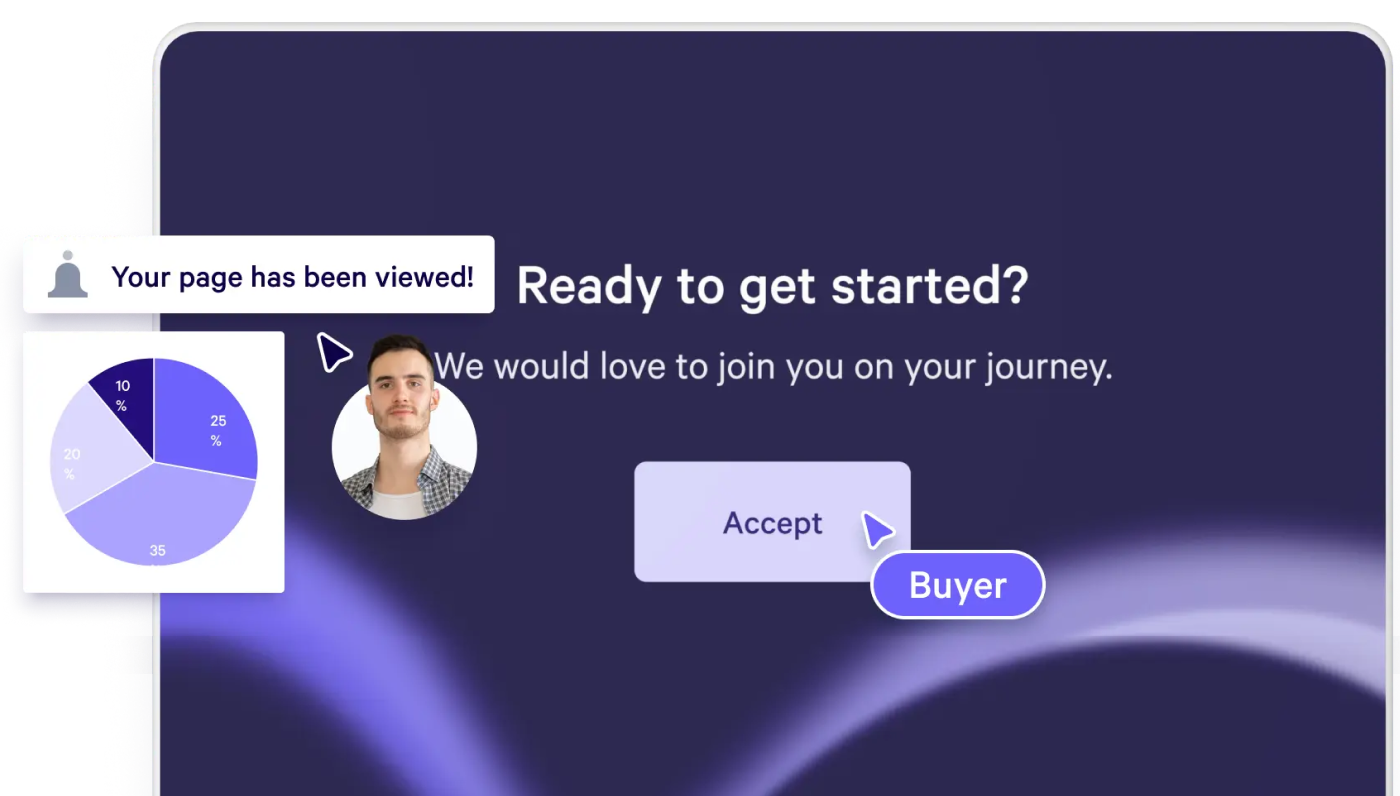
Sales objections are an (almost) inevitable part of the sales process, much like tax season.
You may not know when objections will arise or what specific concerns your prospects will raise, but you can still take proactive steps to preempt and handle them effectively.
The good news?
Anticipating a sales objection does not have to feel like you're facing an impending disaster: it's something you can preempt, address, and win over. When you understand the most common sales objections, you can be proactive about overcoming them.. Most importantly, you can better understand how to guide your buyer through the sales process and onto closing the deal.
How to navigate the seemingly perilous waters of sales objections and ride the wave instead of letting it drown your process? We've taken a deep dive into sales objections and how to handle them.
Sales objection character types
Overcoming objections is simpler if you think of your buyers in terms of categories and types of character. Once you identify the character type, it will be easier to approach them (and their rebuttals) successfully:
The early objector
As the name suggests, the early objector raises concerns very quickly. They are generally well-researched and well-informed about your product, so they have their objections ready when you meet them (likely for the first time). These scenarios can be a little intimidating, but the prospect’s preparedness means they’re interested and taking the call seriously.
Pro tip: When asked a very technical question, give an equally technical response. Showing your knowledge and expertise can build trust and help ease any worry they have.
The silent objector
The silent objector doesn’t offer as much insight into their issues as the early objector. Instead, they tend to give concise answers and are more challenging to engage. Unlike the early objector, they may not have a clear agenda on what they want to address.
Pro tip: Ask open-ended questions that require longer responses and have plenty of probing questions ready.
The non-confrontational objector
This character type doesn’t want to give their objections in a face-to-face setting. They mostly use email for communication, and they tend to need a lot of time to decide and get input from multiple sources before closing.
Pro tip: Be patient and persistent. It may take more messages than normal, but you should be able to get answers if you keep asking.
The "no" objector
This type of objector is generally someone just learning about the product and may not be as well-informed as others. Many times, they’re not the final decision maker, so their need to surface objections may be limited as they’re primarily fact-finding.
Pro tip: Arm them with helpful information they can take back to their team. Having an advocate on the inside is always helpful.
The four types of sales objections
If you’ve been in sales long enough, you’ve probably heard any number of reasons why a prospect isn’t ready to close a deal. Though they may vary wildly, most objections tend to fall into one of four categories:
1. Price
Cost is the most common thing people object to. HubSpot research found 35% of sales reps list price objections as the top challenge when selling. Though many reps might categorize the objection as an issue with the price, what the prospect is really objecting to in most cases is perceived value. If you can show that the value of the product is higher than the cost, you’ll be one step closer to closing the deal.
If you’ve been running into price objections with your customers, you may want to read this article on value selling, for more insight on this topic.
2. Lack of Need
The “need” objection is very similar to the "price" one, with some nuances. The buyer may be saying they don’t need the product, but what they really mean is they don’t need it now. Qualifying urgency early is a very smart move, as it's a good indicator of whether or not a deal will close.
Like with the price objection, the opportunity here is to show the value your product brings. You can also use a "need" objection to create urgency by showing your buyer the cost of doing nothing. When you mix these tactics, your prospect no longer questions whether they need your product. Instead, they start to consider exactly how much they need it and how soon they can get it.
Shameless plug: Qwilr’s ROI calculator is excellent for illustrating product value or showing the cost of the status quo!
3. Urgency
The "urgency" objection usually occurs when the buyer feels that your timeline is too aggressive — or why action needs to be taken as soon as possible. For example, they may feel the implementation timeline or contract length is too short. Or they may feel your timeline is too long and don’t want to wait for the product.
One way to overcome this type of objection is by showing flexibility. You should also be prepared to walk them through the benefits of each timeline and find a happy medium that works for both parties.
4. Authority
If you’ve ever heard the phrase, “I need to talk with my manager first,” that’s an objection based on authority. Simply put, they’re saying they’re not the decision-maker and need to involve someone else to get final approval.
In these situations, be sure you have great sales collateral that your prospect can share with their team. The easier you can make it for them to pitch your product internally, the better: you save time, and ensure you make your point. Your prospect can comfortably bring up the topic with their managers to reiterate how your product addresses their pain points.
Preparing for objections
While you may not know exactly which objection you’ll face, you can apply a few techniques to preempt potential arguments and be better prepared. Here are some of the best ones we've tried at Qwilr:
Exposure therapy
If you have extreme fears or even allergies, you may be familiar with “exposure therapy.”
This type of therapy involves exposing you to small amounts of an allergen over a period of time, so your body can get used to the allergen and eventually stop reacting to it. You can use the same process to learn to handle sales objections.
Though nothing is quite as good as an actual interaction with a prospect, role-playing can help get you more comfortable handling objections. If you decide to try role-playing exercises, be sure that you have a goal upfront to get the most out of it.
Sharing objections with the team
Another exercise to consider is one for your sales team meetings. Set aside 10-15 minutes for everyone to mention the most common objections they’re hearing and have others give tips on how they’ve responded in the past. Your teammates have a ton of collective knowledge — why not use it?
Battle cards
One last option to consider is developing “battle cards.” This tactic boils down to having a succinct document of talking points to use when your competitors come up in conversations. Again, leveraging your team’s experience is helpful here. Talk to your teammates to learn what prospects most commonly say about competitors and what types of counterpoints work best, then write it all down in one place that’s easy to reference while on a call.
Responding to sales objections
You shouldn't take objections as negative feedback — they’re actually an opportunity to learn and improve. By paying attention to objections, you can better understand your prospects and strengthen your offering. Plus, if you handle the situation correctly, you may actually turn an objection into an opportunity. Or, as sales professional and author Brian Tracy says, “Treat objections as requests for further information.”
Of course, every prospect is different, and so are their concerns. Still, successful counterarguments revolve around four key elements: active listening , acknowledging the prospect’s concern, addressing the matter at hand, and confirming that the issue has been addressed.
Listen
Dale Carnegie's How to Win Friends and Influence People is a staple for sales reps (and people in every industry, for that matter.) One memorable quote from the book is, “You can make more friends in two months by becoming genuinely interested in other people than you can in two years by trying to get other people interested in you.”
In many ways, this quote encapsulates the key to overcoming sales objections. When you're genuinely interested in your prospect’s needs, , their questions, concerns, and objections will become plain to see — and you'll be better positioned to address them. So, instead of jumping the gun and cutting your prospects off in the middle of their objection, let them finish their thought and actively listen to what they have to say.
Acknowledge
All people ever want is to be heard and understood.
Your prospect is no different. When they do raise a concern, it’s important to validate that concern by acknowledging it. For example, let’s say your prospect is concerned about price. You might acknowledge that concern by saying, “Cost is always a big consideration. What about the cost is worrisome for you?”
Asking a follow-up question furthers the conversation and could be an excellent way to uncover their real concerns. Research conducted by Gong shows that asking between 14 and 18 questions during a call correlates with higher success rates when compared to interactions where reps ask fewer questions.
Need more ideas on what to ask during sales calls? Take this free discovery call checklist with 35 questions to help you prepare and improve your call effectiveness.
Address
Now that you know the customer’s objection, its time to address it. .
One suggestion for addressing an objection is simple: be honest. Sometimes, that means you must tell a prospect you can’t fulfill a need. It's far from ideal, but it can help you build a trust with your customer and a positive reputation.
Keep in mind that Harvard Business Review reports peer recommendations to influence around 90% of all B2B buying decisions. So, even if you don’t sell to that prospect directly, honesty could earn you a recommendation somewhere down the line.
On the flip side, if you can actually meet a need, be sure to lay out the steps you’ll take to fulfill it. Doing so will help the prospect feel more comfortable with the purchase decision.
Confirm
The final step in handling an objection is confirming with the prospect that it’s been addressed. Even something simple like, asking,“Does that address your concern?” is enough. If they say no, you can ask further questions to determine what else they will need to see or hear from you to move the deal forward. If they say yes, it’s a signal you’re both in agreement and can move on to the next step in your sales process..
Specific examples of overcoming sales objections
There are as many specific sales objections examples as people in the world. And sales rejections can be hard to take, especially when you've put a lot of work into finding the best-suited prospects, showcasing your product, and understanding their needs. Rejection is not the end of the world, though — nor does it have to be the end of the line with a prospect firmly objecting to purchasing your product.
With that in mind, here are a few examples of common sales objections and how to address them.
Sales objection #1: “I'm just not interested.”
This may feel like a brush-off, but you can turn it into an opportunity.
When someone says they're not interested, they could be thinking any of the following:
- They are actually not interested
- They already use a similar product
- They have a different product in mind
- They don't understand the benefits of using your product
- They don't see the value in your product
Your first reaction might be to contradict them — but keep in mind that it would only make your prospect even more defensive, and that leads nowhere. Instead, show empathy, listen, and try to understand why they're not interested in what you have to offer. If you pay attention, you will likely uncover a more specific objection that you can then address — and thus, you will be able to continue the sales conversation and get your prospect into a warmer stance.
Here's what you could say in this type of situation:
"I understand that you may not be interested in our solution, and I'm okay with that. Could you help me understand why?”
Sales objection #2: “I don't have enough budget.”
If your prospect expresses this type of rebuttal, it’s essential to find out why. In these cases, you need to dig deeper to get to the real objection — the root cause of their budget worries.
You can also try to empathize and validate their opinion by simply saying, “I understand that budget can be a challenge, but..." and then you can reiterate the value of using your product. This is a great opportunity to showcase data, social proof, testimonials, or case studies demonstrating your product's return on investment (ROI).
Doing this can shift your prospect’s mindset from viewing your product as a cost to an investment.
Here's an example of how you could turn this to your advantage:
"I understand that budget can be a challenge, but our product has been proven to produce an ROI of X%. For instance, Client X reported a 10% increase in sales after implementing our product. Would that be something that could interest you?”
Sales objection #3: "I don't think I need this right now."
This type of objection frequently stems from a sense of complacency. The real reason people say this is that they either want to postpone looking for a solution or are downright not interested in making a change and trying to let you down easily.
The best way to turn the situation to your advantage is by bringing your prospect out of their comfort zone and showing them why they need to make the changes you are proposing. Creating a sense of urgency (or "fear of missing out") can help you steer them in the right direction.
Here's an example of what you could say:
"I understand you may not need this right now, but in the long run, it will benefit you greatly. Just the other day, I was reading this article (link) on how [name of competitor] is using [product category] to [achieve something.] Plus, there's this study from [reputable research company] showing that [product category] is at an all-time high adoption rate. I think it would help your company [achieve something greater] if you do decide to go for it. What do you think?”
Sales objection #4: "We already work with [competitor name]."
This one might feel like a sting, but it's a very good sign that the customer is already using a solution in your category. This means they are familiar with the process and may just need some convincing that your product can do more than that of your competitor.
Ideally, this is where you could show them case studies and comparison pages on your website, showcasing how your product is better than the one they're already using. It's essential to have a Unique Selling Proposition that differentiates you from other market players, including their current supplier.
Here's how you could spin this to your advantage:
"I understand that you are already working with [competitor], and that's great. But what would you think if you could do everything you do now with [competitor name], but with added [benefit] and [benefit] at a much better price? Switching to [your company name] is an easy process, and we actually have existing clients who've done it already. For instance, here's a case study (link) of how they increased their [activity] by X% when they switched from [competitor]to us. Would that be something you would consider?”
Sales objection #5: "Your price is too high."
This rebuttal is similar to the budget-related one mentioned before — with one major difference. If someone says your product is expensive, they might be trying to get a lower price from you, or they may just be using or considering something less costly. Either way, they are somewhat warmed up to the idea of using a product in your category, and they do have some budget for it — it's just that they might not be willing to go as high as your price.
In this case, you should focus on the value of your product and how it outweighs the cost. You can also offer them payment plans, or other incentives that make it easier for them to get your product.
Here's how you could respond to this:
"I understand that our price may seem a bit high, but I can promise you that the value you get for it is well worth it. Plus, we have various flexible payment options to help you get started with our product. Would you like me to explain them in more detail?”
FAQs
What are the 4 major sales objections?
The four major sales objections are price, need, urgency, and authority. The price objection refers to customers objecting to a product or service's price, the need objection is when they don't think they need the product or service, the urgency objection is when they don't feel any sense of urgency to take advantage of an offer, and the authority objection is when they are not the decision-makers in their company.
What is the most common objection in sales?
There are many common objections in sales. Some of the most common types of objections salespeople point out include price/ budget, complacency/ urgency, mistrust/ credibility, and features/ benefits. Each of them can be counteracted with the right approach, but it's important to be aware of them and know how to respond.
Putting Your Objection Handling Skills to Good Use
Uncertainty is uncomfortable, but it’s also an almost unavoidable part of the day to day in B2B sales. If you’re worried or fearful of objections, know that you can overcome those feelings by being prepared.
Keep an eye out for some of the common types of objectors and sales objections described here. That way, when an objection does arise, you can set your fear aside, confidently acknowledge it, and address it.
You can also use objections to learn more about your prospect’s needs, better explain the value of your offering, build your reputation through honesty, and move the sales process forward.
Most of all, remember it’s a process. The more you experience, the more comfortable (and confident) you’ll get. It may be uncomfortable at times, but it’ll all pay off in the long run. Your role is not to push sales pitches and templated collateral and give up as soon as you face a prospect’s objection.
Your job is to help eliminate a business problem and help your prospect navigate the buying process successfully. Yes, rebuttals can feel like roadblocks — but handled correctly, they can be an opportunity for you to better gauge your product’s capabilities and underline your value proposition.
About the author

Marissa Taffer|Founder & President of M. Taffer Consulting
Marissa Taffer is the Founder & President of M. Taffer Consulting. She brings over 15 years of sales and marketing experience across various industries to a broad range of clients.




